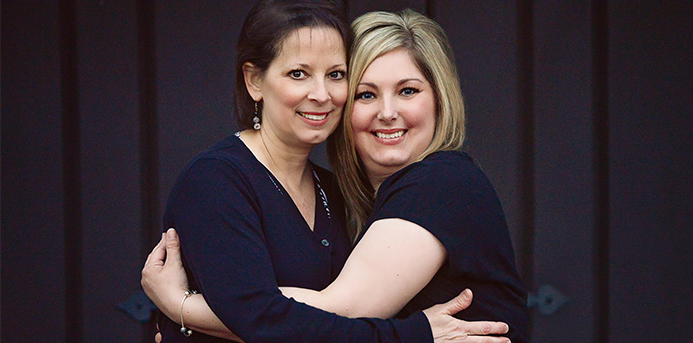Kristin Wolski of Oak Lawn lives with chronic debilitating pain and fatigue so severe that she’s no longer able to care for her three young children without help. A self-described “Type A Personality,” Wolski had always succeeded in achieving her goals through determination and hard work. But now her life feels out of control, and she has little power to fix it.
Wolski suffers from the effects of sarcoidosis, an insidious and obscure disease characterized by a malfunctioning immune system. Instead of acting as a discriminating protector that mounts an attack against illness-causing bacteria and viruses, Wolski’s immune system damages her own cells. In the nearly three years since her symptoms began, Wolski’s life has dramatically changed. Before sarcoidosis, she was an energetic mom who, in addition to raising her children, worked 12-hour shifts as a nurse in a pediatric intensive care unit. She led a happy and busy life. Then it hit.
“Within weeks of having my son, I knew something wasn’t right,” Wolski says.
More from Make It Better:
- How Social Media is Helping Patients Battle Cancer
- Young Mom Has Stroke Two Weeks After Birth of First Baby
- Midlife Depression: Common Causes and What You Can Do About It
She experienced pain in her tailbone, severe aching in both legs, extreme fatigue and insomnia. Her physicians attributed the pain and exhaustion to her recent cesarean section and the physicality of caring for three young children. But Wolski felt certain her symptoms were caused by something more.
Over the next year and a half, Wolski’s pain and fatigue increased. She also began to suffer from night sweats, hair loss, intolerance to cold, rectal bleeding, flu-like symptoms, irregular menstrual periods and shortness of breath. Wolski endured many tests, biopsies and treatments. Unfortunately, despite positive test findings, no diagnosis fit all of her symptoms and medications provided little relief. Over time, her pain—a chronic aching and throbbing from waist to toes—became so excruciating that it severely limited her ability to stand or walk for any length of time.
“On the last day I worked, the pain was so bad I was in tears,” Wolski says. “It had spiraled out of control and was progressing faster and faster. I couldn’t work anymore, and I had a hard time taking care of my kids.”
The next six months brought muscle tics, increased insomnia, sleep apnea, difficulty swallowing, numbness and tingling of the upper extremities, as well as dry eyes, mouth and throat. Wolski’s mom, Bonnie Hughes, who is also a nurse, kept a detailed log of her daughter’s symptoms, tests and medications. Aching to help her daughter who’d been suffering for two years, Hughes drove Wolski to the Mayo Clinic, and an exploratory surgery finally determined conclusively that she had sarcoidosis.
Wolski remembers that moment: “It was bittersweet. I finally had a diagnosis, but then, no one knows much about it.”
Sadly, Wolski’s experience is not unique. According to the Foundation for Sarcoidosis Research (FSR), almost 15 percent of sarcoidosis patients surveyed last year reported that it took more than five years to identify the source of their illness. Wolski is one of an estimated 200,000 individuals living with sarcoidosis in the U.S., but this is only an estimate because many people go undiagnosed. Obtaining a correct diagnosis proves difficult because sarcoidosis affects individuals differently depending on the number and type of body organs damaged by the immune system. As a result, individuals with sarcoidosis often have different symptoms or combinations of symptoms.
Another factor contributing to misdiagnosis is lack of awareness. Sarcoidosis is a rare disease that’s generally unheard of—much like Amyotrophic Lateral Sclerosis (ALS) used to be. Last year’s Ice Bucket Challenge generated huge public interest and support for ALS.
For years, grassroots organizations have worked diligently to raise sarcoidosis from obscurity and gain funding for research. So much about sarcoidosis remains unknown, and many of its treatments are still experimental. Recently, FSR personnel and supporters achieved federal funding for a national sarcoidosis patient registry they’d championed. This registry, FSR-Sarcoidosis Advanced Registry Cures, is already up and running, and FSR encourages individuals with sarcoidosis to enter and update their medical information in this safe, user-friendly national database. As the registry grows, researchers will have access to a treasure of de-identified data that may one day improve treatment options and lead to a cure.
One year after her diagnosis, Wolski feels grateful to have found Nadera Sweiss, MD, a dedicated sarcoidosis specialist and the director of the Sarcoidosis Translational Advanced Research Program at the University of Illinois. She has also started the Positively Sarcoidosis Support Group. Wolski’s case is severe and finding the medications best suited to her body has been a long and arduous process thus far. Unfortunately, she hasn’t felt much improvement to date. But, she tries to stay as involved as possible on a day-to-day basis, remain hopeful that better days are ahead, and count her blessings—her children being first among them.
“They call this an invisible disease because you look good, but you feel so horrible on the inside,” Wolski says.

